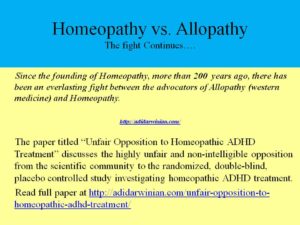On the Unfair Opposition of the Scientific Community to the Study Investigating Homeopathic ADHD Treatment
I find it highly non-intelligible and unfair why the scientific community, comprised of scientists and western-medicine physicians (allopathic physicians in homeopathic jargon), is against the study investigating the use of homeopathic preparations in the treatment of Attention Deficit Hyperactivity Disorder (ADHD).
The opposition to the randomized, double-blind, placebo controlled homeopathic ADHD treatment study was addressed in the form of a letter from the Office for Science and Society of McGill University in Montreal, Quebec, Canada. The letter was signed by ninety scientists and physicians, and addressed to Dr. Heather Boon, Dean of the Leslie Dan Faculty of Pharmacy at the University of Toronto.

About the Study Investigating Homeopathic ADHD Treatment
The Leslie Dan Faculty of Pharmacy at the University of Toronto, Ontario, Canada is presently conducting a randomized, double-blind, placebo controlled study for the homeopathic treatment of children and adolescents in the age group of 6 to 16 years, who have been diagnosed with Attention Deficit Hyperactivity Disorder / Attention Deficit Disorder (ADHD / ADD). The 28-week randomized clinical trial (RCT) aims to investigate the use of homeopathic remedies (homeopathic medication) in the treatment of Attention Deficit Hyperactivity Disorder. Children and adolescents taking a stable dose of medication are eligible for taking part in this study. ClinicalTrials.gov identifier for this clinical trial of homeopathic remedies in the treatment of children and youth with ADHD is NCT02086864. This study is currently recruiting participants.
Before enrolling in the homeopathic ADHD treatment study, the children and adolescents willing to participate in the study are required to undergo a full assessment by a psychiatrist specializing in child and youth mental health. This thorough assessment aims to confirm the diagnosis of ADHD and screens the participants for inclusion/exclusion criteria of the study.
About the Pilot Study of Individualized Homeopathy for ADHD
The results of the open-label pilot study of individualized homeopathy for Attention Deficit Hyperactivity Disorder (ADHD / ADD) that preceded the current study were found to be favorable, and thus, warranted further larger study.
Participants recruited for this study had a diagnosis of ADHD and were in the age group of 6 to 16 years. Participants were required to complete one baseline screening and nine individualized homeopathic follow-up consultations. The symptoms of ADHD were assessed using the Conners 3rd Edition (Conners 3) assessment questionnaire administered to parents at each consultation. The Conners 3rd Edition (Conners 3) is a highly effective tool for conducting thorough assessment of ADHD. The difference in Conners Global Index – Parent (CGI-P) T-score obtained before and after the study was evaluated for each participant. The change in the median CGI-P T-score from baseline to the end of the study was found to be statistically significant.
No Valid Reason to Oppose the Study Investigating Homeopathic ADHD Treatment
The results of the study will automatically clarify the status of the effectiveness of homeopathy in ADHD. Homeopathy has survived more than 200 years of continuous existence and is widely practiced around the world. Therefore, it will be a fair act on the part of the scientific community to accept the running of this study of homeopathic treatment of ADHD.
Moreover, the design of the current homeopathic ADHD treatment clinical trial conforms to the current robust standards for conducting clinical trials as the study in question is randomized, double-blind, and placebo controlled. Also, the results of pilot study of homeopathic ADD treatment are favorable to the running of the current study.
Opposition of the scientific community to the study investigating the homeopathic ADHD treatment appears to reveal a hidden apprehension in the minds of the modern scientists and practitioners of western medicine that if the results of the current study happen to be highly favorable to homeopathy, then this might prove disastrous to their monopolistic medicine.
References:
https://blogs.mcgill.ca/oss/2015/02/23/why-yet-another-study-of-homeopathy/
http://www.pharmacy.utoronto.ca/research/homeopathy-adhd
https://clinicaltrials.gov/show/NCT02086864
http://www.karger.com/Article/FullText/368137

I think people are now getting aware through the internet about the unjustified condemnation of homeopathy by the western medicine.
If western medicine (modern medicine / conventional medicine / orthodox medicine) will acknowledge the effectiveness of alternative medicine such as homeopathy, then the future of the pharmaceutical industry (backbone of modern medicine), worth several hundred billions of US dollars per year, will be lost in darkness. So, monetary interests keep modern scientists and physicians at bay from accepting the safer system of medicine (homeopathy).
This is an extremely well written paper discussing opposition of western medicine to homeopathy. Western medicine never forgets to condemn homeopathy and this really reflects how much fear advocators of western medicine carry in their hearts regarding effectiveness of homeopathy.